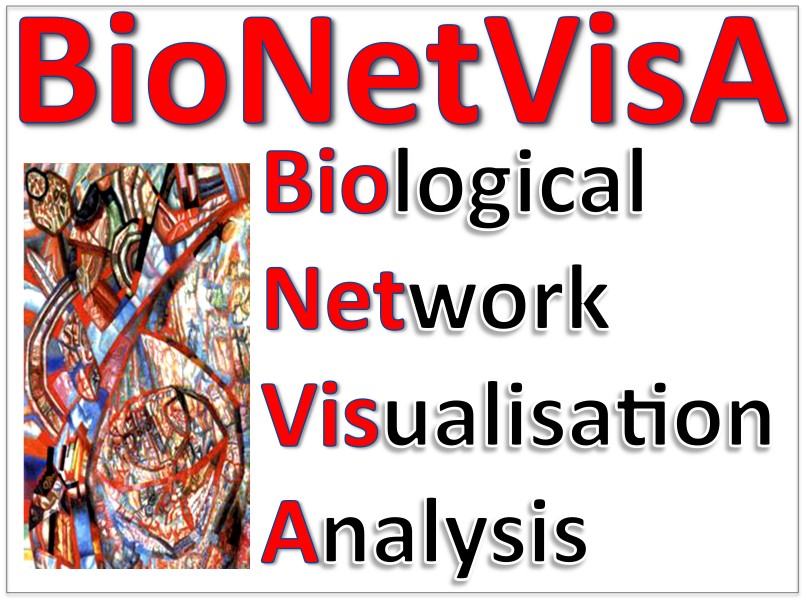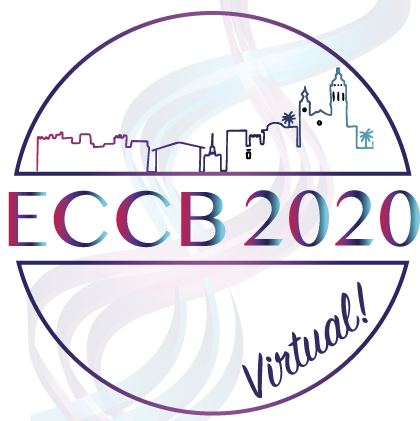
Biozentrum-the new building- University of Basel
Spitalstrasse 41
4056 Basel, Switzerland

BioNetVisA 2020 workshop -virtual
From biological network reconstruction to data visualization and analysis in molecular biology and medicine
The workshop presentations are available here, and the prerecorded videos are available here
BioNetVisA workshop brings together different actors of network biology from database providers, networks creators, computational biologists, biotech companies involved in data analysis and modeling to experimental biologists, clinicians that use systems biology approaches. The participants are exposed to the different paradigms of network biology and the latest achievements in the field.
Motivation
The goal of BioNetVisA workshop is to build a discussion around various approaches for biological knowledge formalisation, data integration and analysis; compatibility between different methods and biological networks resources available the field; applicability for concrete research and clinical projects depending on scientific question and type of high-throughput data.
The BioNetVisA workshop aims at identifying bottlenecks and proposing short- and long-term objectives for the community as discussing questions about accessibility of available tools for wide range of user in every-day standalone application in biological and clinical labs. In addition, the possibilities for collective efforts by academic researchers, clinicians, biotech companies and future development directions in the field will be discussed during the round table panel.
Audience
The workshop targets computational systems biologists, molecular and cell biologists, clinicians and a wide audience interested in update and discussion around current status of network biology, pathway databases, and related analysis tools, including visualization, statistical analysis and dynamic modelling. No computational background is required to attend the workshop.
Key Themes
Graphical representation of biological knowledge
Molecular interaction and pathway databases
Comprehensive signalling networks
Networks annotation and curation
Text mining approaches
Contextualisation of networks
High-throughput data visualization, analysis and interpretation in the context of networks
Multi-scale networks
Networks of inter-cellular communication
Network modelling
Machine learning/Artificial Intelligence approaches in network biology
Basic research and clinical application of networks
Microbiome and networks
Single-cell data and network inference
Networks for drug repositioning
Important dates
| June 20 | Workshop's registration open |
| TBA | Workshop's registration deadline |
| September 4 | BioNetVisA 2020 workshop |
BioNetVisA 2020 programme
| Chairs: Inna Kuperstein and Emmanuel Barillot (Institut Curie, Paris, France) |
| 13:30 - 13:50 Multi-dimensional Computational Pipeline for Large-Scale Deep Screening of Compound Effect Assessment Samik Gosh and Ayako Yachie SBI, Tokyo, Japan |
| 13:50 - 14:05 Using inter-cellular communication maps to facilitate network medicine Tamas Korcsmaros Earlham Institute, Norwich, UK |
| 14:05 - 14:25 COVID-19 Disease Map, building a computational repository of SARS-CoV-2 virus-host interaction mechanisms Marek Ostaszewski LCSB, Luxembourg/i> |
| 14:25 - 14:40 AILANI COVID-19 - literature mining and artificial intelligence based question & answering - a scientific assistant for COVID-19 research Biomax Informatics AG, Planegg, Germany |
| 14:40 - 14:55 HENA, Heterogeneous Network-Based Data Set for Alzheimer's Disease Elena Sugis and Ioannis Xenarios UNIL, Lausanne, Switzerland |
| 14:55 - 15:10 Contextualization of molecular networks for human diseases Luana Licata University of Rome Tor Vergata, Rome, Italy |
| 15:10 - 15:20 BioKC: a platform for quality controlled curation and annotation of systems biology models Carlos Vega LCSB, Luxembourg |
| 15:20 - 15:30 Keynote RA-map: building a state-of-the-art interactive knowledge base for rheumatoid arthritis Vidisha Sing University Evry - Paris Saclay, France |
| 15:30 - 15:40 Comprehensive map of the Regulated Cell Death Signaling Network: a powerful analytical tool for studying diseases Cristobal Monraz Institut Curie, Paris, France |
| 15:40 - 15:50 The dynamics of multilayer network community structure Davide Cirillo BSC, Barcelona, Spain |
| 15:50 - 16:05 Latest developments of WikiPathways database: disease applications Martina Summer-Kutmon Maastricht University, Maastricht, the Netherlands |
| 16:05 - 16:25 Reactome Pathway Knowledgebase: Variants, Dark Proteins and Functional Interactions Robin Haw Ontario Institute of Cancer Research, Toronto, Canada |
| 16:25 - 16:30 Closing remarks |
Registration
Deadline TBAOrganizing committee
Emmanuel Barillot (Institut Curie, France)
Hioraki Kitano (RIKEN Center for Integrative Medical Sciences, Japan)
Alfonso Valencia (Spanish National Bioinformatics Institute, Madrid, Spain)
Samik Ghosh (Systems Biology Institute, Tokyo, Japan)
Inna Kuperstein (Institut Curie, France)
Luis Cristobal Monraz Gomez (Institut Curie, France)
Robin Haw (Ontario Institute for Cancer Research, Canada)
Andrei Zinovyev (Institut Curie, France)